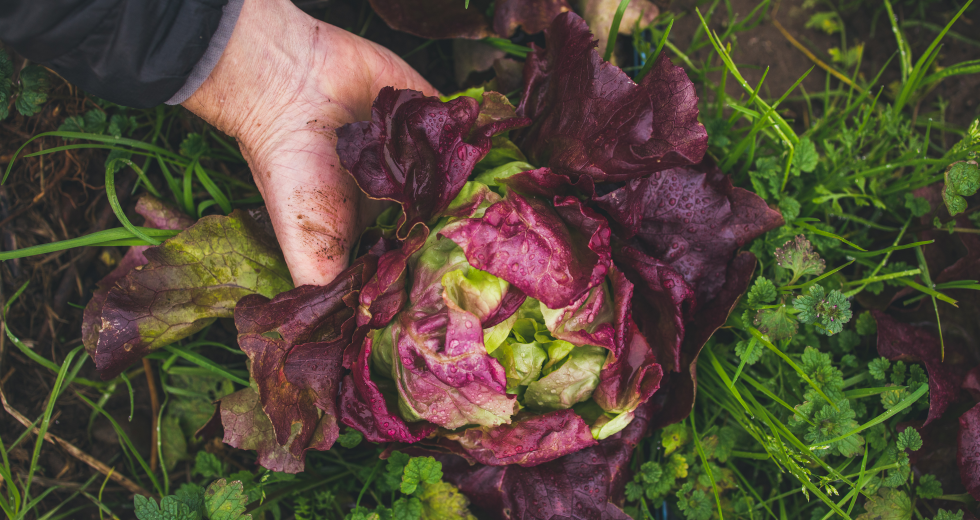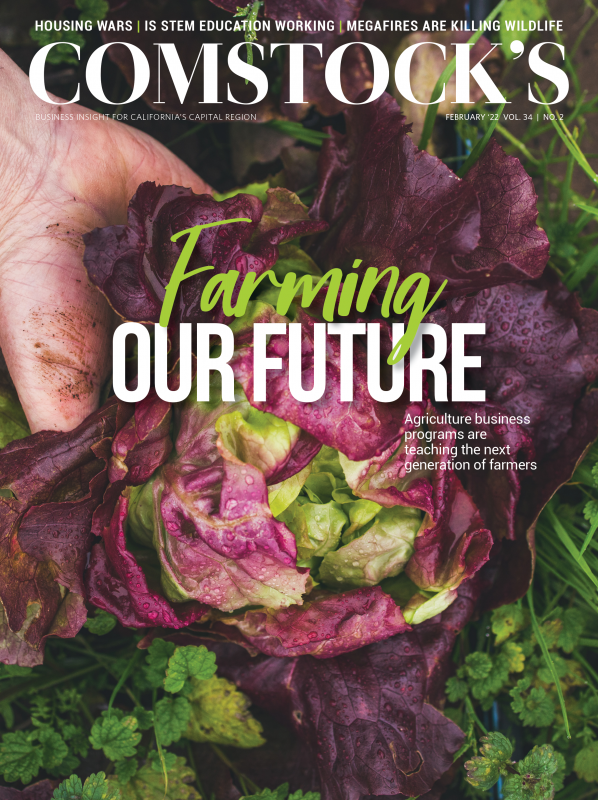Some lessons from the pandemic can’t be forgotten. The crisis shuttered meatpacking plants, shorthanded field crews and logjammed most major avenues of food distribution. When that happened, California’s farm-to-fork credo went from being a healthy dream to something closer to a survival strategy. The message was clear: Cheap food from distant places can quickly disappear, making fresh protein and produce from a community’s backyard a lifeline.
From the perspective of local farmers and ranchers, the barren shelves in grocery stores should have been a wake-up call to support homegrown, eco-friendly and family-owned operations.
In 2022, that’s easier said than done. The challenge of having long-term, locally sourced food goes beyond supporting farmers markets and natural food co-ops. According to the 2017 U.S. Census of Agriculture, the average age of a California farmer is 59. That begs the question of what will happen as scores of growers begin transitioning into their hard won retirements. Will Northern California’s network of small farms collapse just as the public begins to understand their value? From Woodland to Truckee, food advocates are hoping to recruit the next generation of agricultural entrepreneurs so that doesn’t happen.
Grayson Carlile and Caitlin Kelley work on developing their
agricultural skills in Nevada County with Sierra Harvest.
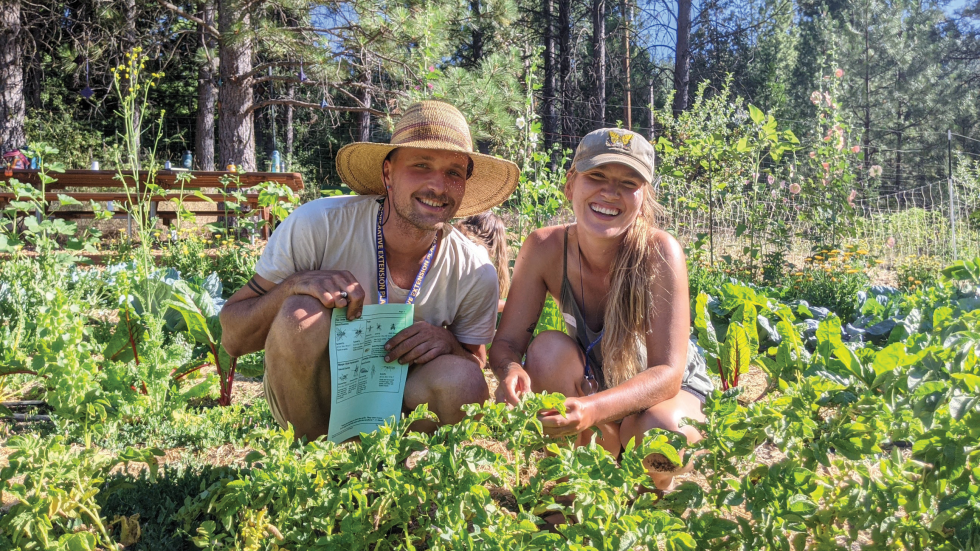
“We believe that local food is our future,” says Rachel Berry, associate director of Sierra Harvest, a Nevada City nonprofit working to cultivate a new class of agrarian dreamers. “Right now, we produce 2 percent of our food in Nevada County. That means that when there are issues with the global food network, we don’t have a whole lot to eat here. … If we can invest in and buy more of our own food, then we can bring millions of dollars into our community. It’s about the economic possibility as much as it is the underlying problem of food security.”
Pastoral visions, business realities
Nevada County’s eye-catching farmers markets flash every color: hues of strawberries, blueberries, raspberries, peaches and plums. The fall shades of eggplants, carrots, broccoli and basil glow in the sunlight. Carts are filled with crimson and emerald gradations of chili peppers. Baskets spill over with a dazzling array of yellow, orange and red tomatoes. The scene is often bustling with shoppers grabbing honey from nearby bees, eggs from local chickens, lamb and steak cuts from nearby ranches.
If the area was only known by these sprawling, year-round markets — and the BriarPatch Food Co-op in Grass Valley — it would still be a haven for small-scale growers with their hands in the soil. But some of Nevada County’s most popular restaurants have also committed to farm-to-fork menus utilizing these same green thumbs, while efforts are underway to get their products purchased for everything from school lunches to food banks and food stamps.
An inclination of such local possibilities drew Molly Nakahara to start Dinner Bell Farm with her husband Paul Glowaski near Grass Valley in 2010. But Nakahara soon learned what many rookie farmers discover: While the profession offers a lot of freedom and connection with the outdoors, it’s a demanding business endeavor on multiple fronts. Each crop has to be treated as its own product, with its own expenses, growing requirements, packaging needs and income projections. Small farmers also have to keep their own financial books, oversee their own payroll and, in some cases, act as their own human resources department. Finally, small farmers in California take time away from tending the land to keep up with regulations around food and worker safety.
“Farmers have to wear so many different hats,” Nakahara says. “One of the most challenging things in starting a small, diversified farm is how very labor-intensive it is. So, right out of the gate, you’re going to have high labor costs. … Those of us who end up doing this say, ‘We’re out to make a living, not a killing.’”
Some in Nevada County have even failed at the former. Sierra Harvest was formed in 2013 to try to change that calculus. One of its main offerings is its Farm Biz program, which provides beginning farmers — those with zero to five years of experience — with 15 hours of direct classroom training from veteran growers in their area who volunteer to lend their experience. (Applicants can pay a fee or apply for a scholarship.) After many hard-earned lessons in agriculture, Nakahara oversees that program.
“We try to do a lot in these classes, but we don’t want to overwhelm them either,” Nakahara says. “It’s about helping them achieve efficiency and scale as quickly as possible within the perimeters they have.”
Shawn Harrison, founder and co-director of Soil Born Farms, walks
through an orchard at the 55-acre site in Rancho Cordova. Soil
Born Farms is one of several farms in the Capital Region that
provide training programs for farmers.
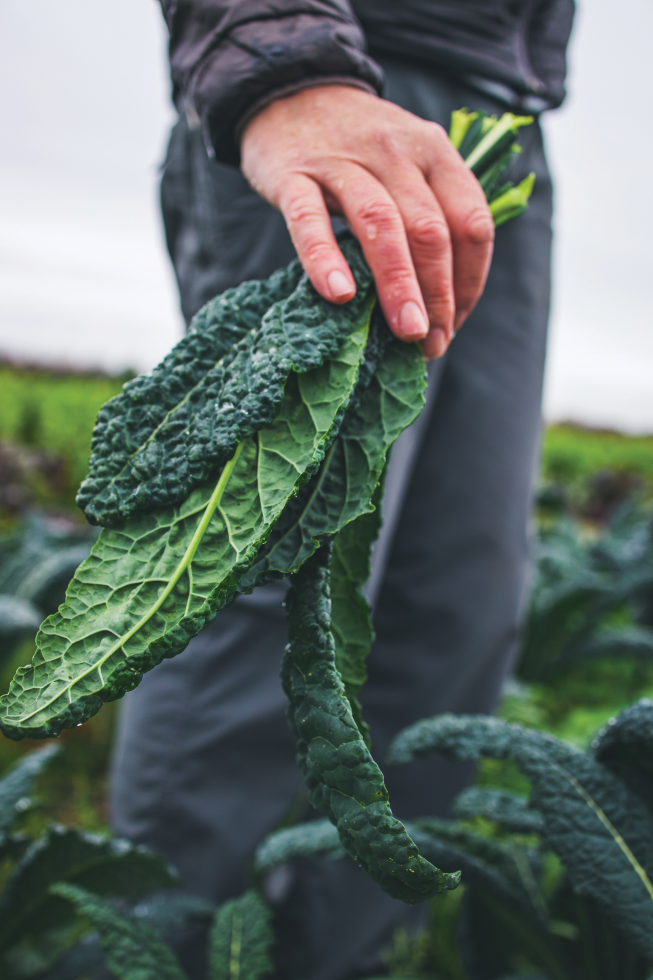
“We were really trying to come up with a concise business plan,” Cate says. “What’s our price points going to be? What is our marketing strategy? The Sierra Harvest program was fantastic because it showed the experiences that farmers actually have, and it really helped get us to where we needed to be.”
Jackie Cheng, who’s starting a small farm in rural Yuba County, got the same boost from Sierra Harvest. Cheng is a journeyman carpenter who decided to make a career change during the pandemic. Going months without work left him to clear brush on a piece of land he’d bought in Brownsville. The work began inspiring him.
“Here in the foothills, there’s not enough fresh fruits and vegetables, and I think I can make a difference with that. … The Sierra Harvest classes … show you which markets will take your inventory, which wholesalers you can talk to about buying your harvest, and which California regulations will matter for what you’re farming.”
Jackie Cheng, aspiring farmer, Yuba County
“The more I did that, the more I liked being out there,” Cheng says. “Here in the foothills, there’s not enough fresh fruits and vegetables, and I think I can make a difference with that. … The Sierra Harvest classes get right to the point because it’s local, so they’re showing you which markets will take your inventory, which wholesalers you can talk to about buying your harvest, and which California regulations will matter for what you’re farming. Without them, I would have run into so many roadblocks.”
Cameron Redford, owner of Black Sierra Honey Company in Nevada City, attributes founding his business in part to Sierra Harvest. The nonprofit was able to help him find an agricultural loan to start his business.
“I didn’t have any business experience,” Redford says. “Sierra Harvest helped me figure out how to get a plan together, and to know how to actually make the purchase.”
All of the small farmers that Comstock’s spoke with in Nevada and Yuba counties say learning from their experienced counterparts was one of the biggest benefits to Sierra Harvest’s strategy. Nakahara says the classes are designed that way for a reason.
“Farming is sort of a myopic profession in that you’re out on your own a lot,” she says. “We’ve learned that by pairing new farmers with a network of existing farmers, it’s supportive on so many levels. They’re gaining professional tips, they’re learning best practices that apply to a specific region, and they’re getting the social and emotional support that a group of peers can provide.”
From one service to another
The grain elevators and wheat silos rising against Woodland’s skyline are a symbol that the city’s been a farming hub since its inception. Its tomato patches, rice fields and grand tracks of fruit and nut trees continue to make Yolo County a large crop producer in California. Woodland is also home to the California Agriculture Museum. Woodland’s long-standing connection to the land is the reason the Farmer Veteran Coalition recently selected the city as its new base of operations. The national organization administers the Farmer Veteran Fellowship Fund, a grant from the USDA tailored to Northern California and aimed at helping former military members find career paths growing food.
The city is also home to one of the FVC’s key partners, the Center for Land-Based Learning, which has long been spearheading broader efforts to bring new farmers into the profession.
The FVC was started in 2007 by Michael O’Gorman, who wanted veterans returning from war to have tranquil, meaningful careers outdoors. In California, the nonprofit’s work includes providing financial and logistical support — and business training — to veterans who own everything from small greenhouses and 3,000-acre spreads to heritage cattle ranches and Christmas tree farms.
“There are different steps, depending on the person, so we try to meet everybody where they’re at and then take them to the next level,” says FVC Executive Director Jeanette Lombardo. “We wanted to be in Woodland because we felt it has a huge history as an agricultural town, and there’s also just a lot of community support for veterans here.”
One veteran who knows that’s true is Alex Jauregui. FVC helped him expand Fury Bees, his beekeeping farm in Woodland from 75 to 1,200 hives. Jauregui was born in Mexico and grew up working in Northern California’s fields as a child. After graduating, he joined the U.S. Army and served two tours in Iraq and one in Afghanistan. On his final deployment, Jauregui stepped on an improvised explosive device, shredding his body, ultimately costing him both legs and some of his fingers. Those injuries took a long time to recover from but they haven’t stopped Jauregui from becoming a beekeeper. The FVC assisted his career development by teaming him with a beekeeping mentor who was also a veteran, as well as buying him a hybrid tractor-forklift.
“The best thing my husband got from Farmer Veteran Coalition was mentorship,” says Juaregui’s wife, Isa Marie McIntyre, who’s also an Army vet. “In terms of the forklift, it’s a lot of hard work lifting bee boxes even if you have your legs, because they’re really heavy. And whenever there’s anything that is easier for him physically, it has a real impact on him mentally, because he’s not in as much pain. … Him not having that physical strain anymore really helped on the family side, too.”
McIntyre was so impressed by what FVC did for her husband that she recently joined its staff and started overseeing the federal Enhancing Agricultural Opportunities for Military Veterans grant to give business training to aspiring farmers who have served in uniform.
“The program is now expanding from Northern California to Southern California,” she says, “and we’re happy to see it grow.”
The land’s future bounty
Paintings of the Golden State’s farmland usually feature broad, rolling hills and sweeping valleys that reach for the end of the horizon. The reality is less romantic, at least for newer farmers. Most of those vast expanses of land are already spoken for. Property availability is one of the biggest challenges for bringing a new generation of farmers into the fold.
Some believe the only way around this dilemma is harnessing crop innovations within much smaller spaces. Soil Born Farms in Sacramento County has been showcasing the ways urban agriculture can be a path forward for the Capital Region. The nonprofit also runs an in-depth apprenticeship program that gives entry-level farmers all the tools they need to hit the ground hoeing.
Harrison tends to seedlings at Soil Born Farms, an urban farm
that provides fruits, vegetables, flowers and agricultural
resources to the community.
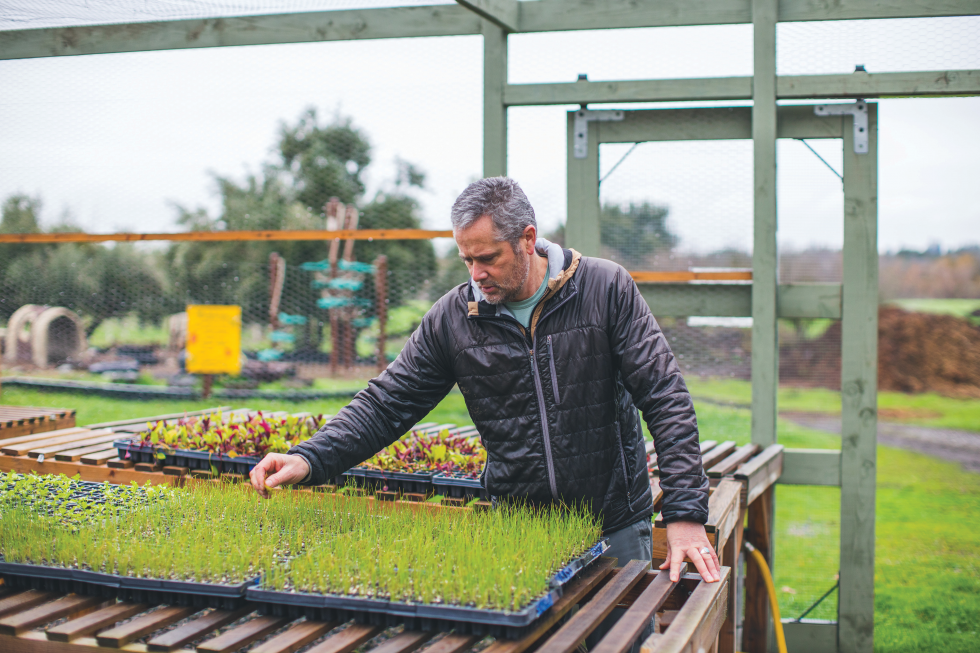
Soil Born Farms started as a small farm in Sacramento and has grown into a 55-acre operation over the last two decades, growing mixed produce, fruit and flowers in Rancho Cordova. Its co-founder, Shawn Harrison, is a first-generation farmer who was a product of an apprenticeship program in Santa Barbara. Several years ago, Harrison teamed up with the Center for Land-Based Learning to create an accredited farmer training program at Soil Born Farms.
“The beauty of what we’re doing is it involves a combination of technical classroom training and paid on-the-job training,” Harrison says. “It’s learning the ins and outs of farming. They’re involved in every aspect of the work with us, from the greenhouses to planting, cultivation to sales. … Ultimately, we’re trying to give them a cross section of experience so they’re employable.”
“They’re involved in every aspect … from the greenhouses to planting, cultivation to sales. … We’re trying to give them a cross section of experience so they’re employable.”
Shawn Harrison, co-founder, Soil Born Farms
The California Farm Bureau Federation’s Young Farmers and Ranchers program, a statewide program based in Sacramento County, is working on a similar initiative with aspiring farmers between the ages of 18 and 35. The bureau offers leadership training and industry farm tours. Program Director Stephanie Younger points out that most open space across California is currently kept that way by agriculture. Given that, and given the fragility of global food supplies revealed by the pandemic, Younger says it’s essential California has grassroots efforts to find its next stewards of the land.
“Sometimes farmers don’t preach their own importance,” Younger says. “While we need to be realistic about how hard the profession can be, I think we also need to be really encouraging of people who are interested, stressing the good parts, including how fulfilling it can be.”
Harrison agrees on how high the stakes are. “With populations growing and resources getting scarce, every community can find itself in a really insecure situation,” he says. “And this is a problem across the country that we should be trying to solve, unless we want to turn over our food security to someone else and be at the mercy of those forces.”
–
Stay up to date on business in the Capital Region: Subscribe to the Comstock’s newsletter today.
Recommended For You
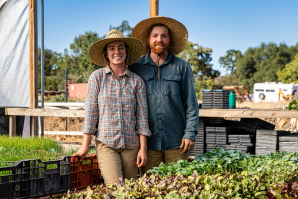
Back to Their Roots
Amador County’s Upcountry Farms finds success through trial and error
A young Amador County couple is making their mark with a small-but-mighty vegetable farm in Ione. Starting with little experience, they’ve grown into one of the region’s most popular small farms.
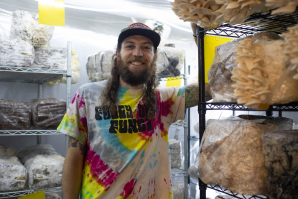
Fascinating Fungi
Foggy Dew Fungi brings gourmet mushrooms to the Capital Region
Foggy Dew Fungi is a small, family-operated gourmet mushroom farm deep in the hills of Newcastle in Placer County, built on respect for nature and strong community ties.

Status Check: Finding an Agricultural Coworking Space
After 19 years in Winters, the Center for Land-Based Learning welcomes farmers to a larger home in Woodland.
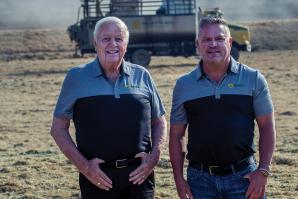
Filling a Niche
Family business close-up
A father-and-son team have kept Newcastle-based Selby’s Soil
Erosion Control business operating since the 1960s.
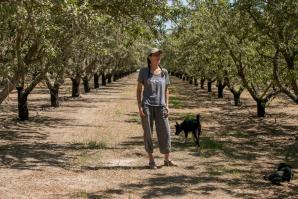
Torture Orchard
Can science transform California crops to cope with drought?
The search is on to help California farmers find less-thirsty tree crops. But will the experiments come through in time as droughts intensify?



